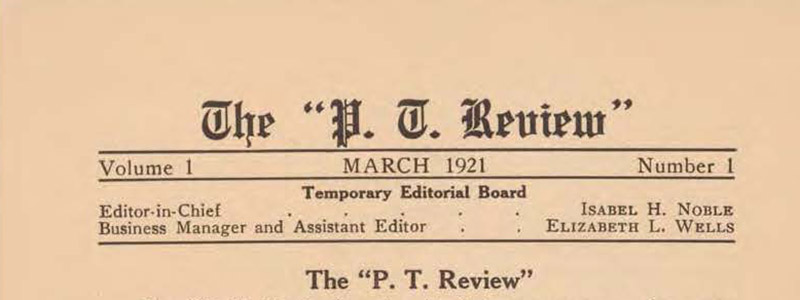It is 102 years since the first editions of The P.T. Review were published. A periodical which would become the Journal of Physical Therapy, now PTJ. Taking the time to step back and immerse ourselves in the writings of those who led the formation of the professional association; that would today represent over 100,000 physical therapists/physiotherapists in the USA, an appreciation for grammatical wit and use of language is recaptured. It is unlikely that such vernacular would survive in today’s social media…
Whilst serious topics were frequently addressed, from the development of the constitution of the American Women’s Physical Therapeutic Association (which would become the American Physiotherapy Association and then the American Physical Therapy Association), to the defense of autonomous practice and educational standards, the simple participation of membership, or lack thereof, was a foundation to turn a phrase and engage an audience both then, and now 102 years in the making… Enjoy.
PT Review – December 1921
Editorial – Elizabeth Huntingdon (Editor-in-Chief)
In the last two last two issues of the P. T. Review there has appeared a paragraph, headed Notice!, that asked urgently for good material to print in the Review. From the cheerful and almost total silence that has followed each appeal one would think that it had read: “The P. T. Review has no need for fresh material. It is stocked up for four hundred years to come. Centuries from now, when aerial polo will have superseded tennis; when the department stores will sell tinted auras and shadowy complexes instead of changeable silks and French-trimmed; when even Colonial doors will wear knickers instead of knockers—the Review will still be drawing on its reserve supply. Anything that you send us now will be destroyed without reading. Keep off! Get out! Stay away! We are sufficient unto ourselves, and need no co-operation, no contribution, no expression of opinion.”
Surely it does not take the editorial mind to realize that no one can concoct an interesting, substantial, quick-fire professional periodical out of thin air, any more than he can print it on the same accommodating material. None of us on the editorial staff of the Review is paid in anything but appreciation – and, by our troth! That payment can’t be said to be always audibly made—and none of us asks for money. But we certainly do ask for some sort of audible reaction on the part of the people for whom we are using up perfectly good spare time that we might invest very agreeably in a multitude of other ways.
We thank the minute proportion of Review readers who have sent us anything—even a roundabout knock that would never have come our way if we hadn’t happened to drop in at Billy the Chowderman’s on that particular Friday, and run into two of the old crowd talking clams and calamities over their “Special To-day”. But we ask—and can you blame us? – what of the several hundreds of subscribers who never whisper? Are they satisfied and interested, or bored and disappointed, or merely indifferent, about the Review? Have they hibernated or atrophied or sailed back to France or forward to Utopia? Are they quick or dead, P. T. or D. T., sound sane, conscious, tickled or pickled’? In short, are they with the REVIEW or of it?
We know nothing. We only suspect that if indeed you live and breathe and have your being, if you go broke and get grippe and like Doug Fairbanks and loathe tapioca pudding and have occasional cold feet—like the rest of us—you also have something to say from time to time that will be of use to the publication that represents you. Jokes, news, articles, cartoons, photographs, quotations, opinions, verse and advertising—can’t you round up something from that assortment before you’re a month old?
A few questions: How much of this did you understand? Does anyone play aerial polo? Can you but a tinted aura and shadowy complex online? Do we currently have dead therapists (D.T)?
Consider – “Sailed back to France”- a simple statement but emblematic of the service of the recreational aides who had recently returned from the Western Front during the Great War (WWI now as we decided to have another one…). The opposite of Utopia. Where is our Utopia now, and where is France? (a lovely place nowadays, but a bit rough in 1918).
Finally, we are ¼ of the way into the 400 years of fresh editorial supplies the PT Review was floating in in 1921. Have we run out of ideas?

